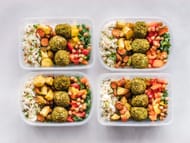People who are searching for extreme weight loss methods tend to choose certain diets and ways of weight loss. The recommendation of these diets by healthcare providers is not widespread.
The diets should only be followed for a brief period; generally speaking, no longer than a few weeks.
The body experiences greater stress when losing weight of this kind, and there is a larger hormonal reaction. One of the reasons weight loss gradually slows down and weight gain happens when dieting is the hormonal reaction.
In actuality, the majority of diets will only result in temporary weight loss. The crux of the matter is their ability to assist you in maintaining your weight, which necessitates a realistic and sustainable plan.
In this article, we will take a look at the different ways in which we can lose extreme weight and do it quickly.
8 quick extreme weight loss methods
Along with the ideal combination of regular exercise and dieting, there are certain methods of losing weight, which are designed specifically for extreme weight loss.
Here are some of these methods.
1. Find non-edible substitutes for self-soothing
Avoid 'comfort food' and use alternative ways to deal with difficult emotions. When you feel stressed, which raises cortisol levels, rather than reaching for food to feel better—since eating triggers the release of the feel-good neurotransmitter dopamine—you raise levels of oxytocin, the love hormone, either by soothing touch, playing with a pet, or getting a hug. Oxytocin reduces calories consumed and has positive effects on metabolism.
If you’re experiencing difficult emotions, a self-compassion break will allow you to give yourself the care you need, so you will be less likely to eat.

2. Eat a Well-Rounded Breakfast
If you’re trying to lose weight, skipping breakfast is not the way to go. Research repeatedly demonstrates that skipping breakfast is linked to obesity and overweight. Those who skip breakfast also generally have diets of lower quality and are deficient in minerals like iron, calcium, and vitamin D.
Ideally, the first meal of the day should be well-rounded, blood-sugar balanced, and rich in protein and healthy fats; it helps us think more clearly and perform better.

3. Eat more plants
A plant-based diet not only promotes weight loss but is also easier to stick to than a low-calorie diet. Plus, it’s nutrient-dense and has numerous health benefits.
Produce supports weight loss because it’s rich in fiber and water, which are both calorie-free and take up space in your stomach, so you feel full. It has been proven that there are links between increased fruit and vegetable consumption and enhanced weight loss.
It should be an aim to consume five daily servings of produce to start and work up to seven to nine servings a day. It is possible if you start your day with a smoothie, have a salad or cut-up vegetables with your lunch, and eat fruit for snacks and desserts.

4. Hit the Weights
Muscle burns more calories than fat. Resistance training is a great addition to any weight-loss program, not just for the calories it burns during exercise but also for the benefits of the “afterburn effect.”
Your resting metabolic rate will increase as you gain muscle mass (RMR). This establishes the calorie requirement for your body to function when at rest. The more food you can eat without gaining weight, the higher your RMR.
While cardiovascular exercise is often emphasized, strength training is key for dropping pounds and maintaining weight loss. Strength training can slow down muscle mass decline.

5. Time-Restricted Eating
This diet strategy is becoming more popular. It is often compared to fasting, but the two strategies are slightly different. Time-restricted eating limits the number of hours per day that you can eat. A popular strategy is 16:8. For this diet, you have to eat all of your meals within 8 hours. The rest of the day, you cannot eat anything. This method causes rapid weight loss, but whether it is sustainable depends on the level of consistency and discipline involved in following this routine.

6. Very Low-Calorie Diet (VLCD)
When following a VLCD, you consume as few as 800 calories per day and lose as much as 3 to 5 pounds (1.5 to 2 kg) every week. The majority of VLCDs substitute prepackaged foods with meal replacements such as bars, soups, shakes, and formulae. This makes it more likely that you will receive all the nutrients you require each day.
VLCD is ideal if we want to reduce a large amount of weight quickly. These diets are often used before weight-loss surgery as well. VLCD diets can be modified with the help of healthcare providers. Most experts do not recommend using a VLCD for more than 12 weeks.

7. Mediterranean Diet
The Mediterranean diet is rich in whole vegetables, fresh fruit, whole grains, fatty fish, olive oil, nuts, legumes, and some red wine and dairy; therefore, it’s a balanced way of eating. The Mediterranean diet focuses on whole, plant-based foods over highly processed junk foods or fast foods.
Naturally, you will eat fewer calories and lose weight if you're eating better foods with more fiber and protein and less sugar and saturated fat.
This extreme weight loss method helps heart and brain health in addition to weight loss; therefore, there are additional health benefits. Mediterranean diets are linked to less weight gain, particularly when accompanied by exercise and followed for more than six months.

8. Flexitarian or Semi-Vegetarian Diet
A flexitarian diet allows you to add small amounts of animal products, like meat, poultry, or fish, for additional protein and satisfaction. If you’re looking to burn calories in a balanced way, this flexible approach may be a good match for you.
Reducing, but not necessarily eliminating, how much meat you eat is generally positive. Semi-vegetarian diets are associated not only with weight loss but also with health benefits such as lower blood pressure and a reduced risk of type 2 diabetes. Although it’s a popular eating approach with women, men, too, may benefit, especially because guys generally consume more meat.

Therefore, extreme weight loss methods include healthy lifestyle changes like eating a balanced and nutritious diet, getting regular exercise, and managing stress. Individuals who lose weight gradually are more likely to keep the weight off and reap benefits like reduced body fat, improved heart health, and more.
